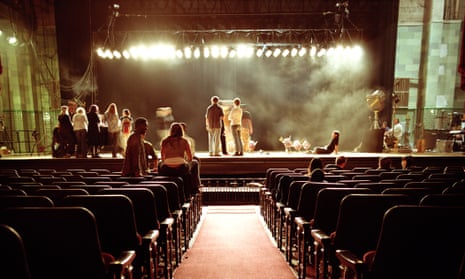On stage I am a lumbering monkey. I make primate sounds; I beat my chest. My teammate, Aran, joins me and grunts back. The audience laughs. So far, so good.
Not long ago, standing in front of a paying audience making monkey noises would have been unthinkable for me. I’d always been a fan of long-form improv comedy but I’d never thought it was something I could ever do – surely making things up on stage, on the spot, is no place for a novelist? We prefer quiet rooms, long silences, time alone. But sometimes when you’re facing a terrible fear, the only thing to do is undertake something even more terrifying.
My fear had to do with my second book. I began my current novel-in-progress as soon as I sent the final edit of my debut novel, See What I Have Done, to my publisher. I jumped straight in with no idea what this new project wanted to be, and started playing with possibilities of characters and story, embracing the joy that comes from creating something from nothing.
Then one day I went to my desk to write and I couldn’t breathe. Instead of words forming, my heart felt as if it was being pushed through a sieve. Hindsight tells me this was a panic attack. It wouldn’t be the last time this happened.
I was becoming afraid of writing. I began second-guessing everything that came out of me. This is no way to work. You cannot create honestly when fear tells you your intuition is wrong, that your ideas are redundant, that you’re going to fail. But oh, how that self-doubt comes, rushes like blood, tries to convince you that these thoughts are a reflection of reality.
I love writing. It’s the only thing I ever want to do. And yet there are cycles of days, weeks, when I lie awake in the cold dark, thinking about all the ways this new manuscript will be a creative failure, will be the thing that exposes me as a hack. That I’ll never have any more ideas, that I’ll never write again. In those moments I often ridicule myself for not being like other writers, for not having a brilliant mind. Sometimes in those moments, I tell myself I need to lighten up and have some fun. It was in one of those moments that I decided to try improv in the wild hope that it would help me cut through the fear.
In the first class, my teacher, Matt, taught us the fail bow: every time you feel like you’ve failed, you take a bow while shouting “I’ve failed!” and your classmates cheer you on. That forced embrace of failure, the thing that I most feared, was immediately liberating, even joyous.
Improv is an art form that can only exist when performers not only trust themselves but each other to work together, no matter the circumstances. Like most creative endeavours, it requires something akin to the meat of yourself: those raw-cut emotions and (often) messy first thoughts, which we throw out like an offering to the world – or in this case a 52-seat theatre in Melbourne. As soon as you blurt something out on stage there’s no turning back. If something you’ve said or done feels utterly mortifying or wrong, you desperately try to make it work. Sometimes it fails and you take a bow anyway. But sometimes it feels electric, and when it does you hold on to that feeling and never want it to end. Relying on nothing but true connection with other people and instinct can be utterly terrifying and unbelievably thrilling.
In trying to finish my second novel, the fear has sometimes become so overwhelming that I’ve woken up screaming in the middle of the night, convinced it’s become a physical presence in my bedroom. And yet I know deep down that writing is a constant process, and that anything that feels hard and complicated and challenging and scary is worth doing.
Improv taught me that. It taught me that to make anything work, we first have to be true to ourselves and each other: to trust ourselves and our ideas no matter how silly they might seem. If it doesn’t quite work, start again. Try another approach.
Eighteen months later, I’m still doing improv and have failed many, many times. It’s been challenging. It’s also been the most fun. One of the many gifts it has given me is the reminder that creativity begets creativity: you will never run out of ideas. Some of them won’t work, but some of them will be so great, so gold, that you’ll chase that feeling over and over again.
